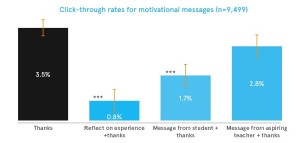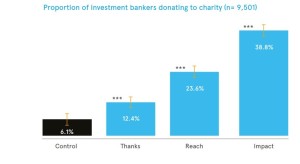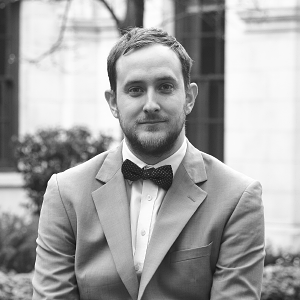From an early age our parents remind us to say “thank you”. But what is the impact of these words? Are employees more productive if thanked for their hard work? Does thanking people for charitable donations encourage them to keep giving? Over the past year, we’ve started to see a pattern in our research – “thank you” can make a big difference.
We recently published a study on teacher motivation with a local group of secondary school heads called the Somerset Challenge. Demotivation can be a major problem in the teaching profession. The evidence suggests that the average teacher finds it harder and harder to remain positive as they progress through their career. So, we decided to test a few ideas to see if we could change this.
The Somerset Challenge sent emails to teachers in Somerset and measured the number of them that clicked on a link to access a professional resource. The emails thanked teachers for their work this term, as well as including one of the following messages:
- a request to write a reflection on their teaching experience to pass onto new teachers;
- a former student telling teachers about the amazing impact they can have;
- a newly qualified teacher sharing her excitement at joining the profession.
We also included a standalone thank you email without any accompanying message. What we found, perhaps surprisingly, was that the most effective message was, simply saying “thanks” (see graph below).
In a different study, Adam Grant and his team found that university call centre fundraisers raised 171% more money when they briefly interacted with a scholarship student. Not only did this give the callers a chance to see the impact of their efforts, it also gave the scholarship recipient a chance to say thank you face to face.
In a final study here at the Behavioural Insights Team, we conducted a “network nudge” experiment. We emailed mid-ranking managers in an investment bank who had previously donated to the bank’s fundraising campaign. This email either thanked them for their prior donation (‘Thanks’ in the graph below); asked to reach out to colleagues in their team (‘Reach’); or asked to not only reach out, but to talk about the impact donations have (‘Impact’). Even a simple “thank you” was enough to double the number of staff members in the managers’ teams donating. When combined with a simple request to reach out and talk about giving the number of people giving was many times higher.
Economists Armin Falk and Urs Fischbacher argue that reciprocity is in part about our perception of why people are behaving as they are. How we respond to a gift or kind act from someone will depend on whether or not we think that they are doing it for the ‘right’ reasons. This theory could be extended to the receiver as well – if I think that you are a “good” recipient, then I may be more likely to give you a gift in the future.
Saying “thank you”, even for little things, builds a virtuous circle of reciprocity, with one good turn leading to another, which leads to another, and so on. It seems our parents were right.


